Director of Public Prosecutions Andrew Chauke's defence in the Nkabinde Inquiry

Suspended Gauteng DPP Advocate Andrew Chauke's team delivered his defence to the Nkabinde Inquiry on Tuesday.
Image: Supplied
National Director of Public Prosecutions head Shamila Batohi is now expected to only testify later this week before the Nkabinde Inquiry.
Batohi was present at the inquiry on Tuesday, awaiting to be the first witness to take the stand, but the afternoon was spent on ironing out issues between the defence team of Director of Public Prosecutions Andrew Chauke and the evidence leader regarding outstanding documents.
Advocate Tembeka Ngcukaitobi, who is representing Chauke in the Nkabinde Inquiry into his fitness to hold office, gave his opening address to the panel, which is headed by retired Constitutional Court Judge Bess Nkabinde.
He said Chauke is not accused of dishonesty, corruption, ulterior motive, personal benefit, or any dereliction of ethical duty. The allegations relate solely to two prosecutorial decisions taken more than a decade ago in the Johan Booysen and Richard Mdluli matters.
In the Booysen matter, he is not charged for authorising racketeering charges against him. That decision was made by the Acting NDPP, Advocate Nomgcobo Jiba. In the Mdluli matter, he is not charged for deciding that murder charges should never be brought, but for withdrawing them pending an inquest in terms of statute, Ngcukaitobi said.
He argued that both allegations against Chauke are vague and embarrassing and do not disclose misconduct on his part.
“The case now advanced against him rests on legal and factual premises that have already been overtaken by judicial authority,” Ngcukaitobi said. He commented that a court held that the evidence did implicate Booysen, and that Chauke was in his right to pursue the racketeering case against Booysen and members of the Cato Manor Unit.
Similarly, the charge relating to the Mdluli matter proceeds on the premise that the withdrawal of the murder charge and the subsequent delay were irrational. Yet the Supreme Court of Appeal has already held that the withdrawal and inquest decision was rational. That judgment, together with the independent review later undertaken by NDPP Mxolisi Nxasana, should conclude the matter, Ngcukaitobi said.
He told the panel that it is against this backdrop that they will lead the evidence of Nxasana and advocates Laurence Hodes, Sello Maema, Silas Ramaite, and Gerrie Nel—all of whom were directly involved in the events now under scrutiny. “They will demonstrate that the decisions in issue were lawful, rational, and grounded in proper prosecutorial principle; that Advocate Chauke acted within the limits of his authority; and that nothing about his conduct remotely approaches misconduct,” Ngcukaitobi said.
He submitted that at the end of this process, the Panel will have no difficulty concluding that none of the charges against Chauke are substantiated, and that they do not meet the constitutional threshold for suspension or removal.
“The charges before this Inquiry do not identify a single clause in the Code, Policy or Act alleged to have been breached. Not one alleges corruption, dishonesty, ulterior motive or bad faith". Ngcukaitobi said the charges are framed in generalities, without pinpointing what rule was violated, how it was violated, or why the conduct of Chauke amounts to misconduct. “If prosecutors could be removed based on dissatisfaction with discretionary decisions long after the fact, without evidence of bad faith or violation of clear rules, independence would be fundamentally compromised,” Ngcukaitobi said.
zelda.venter@inl.co.za
Related Topics: